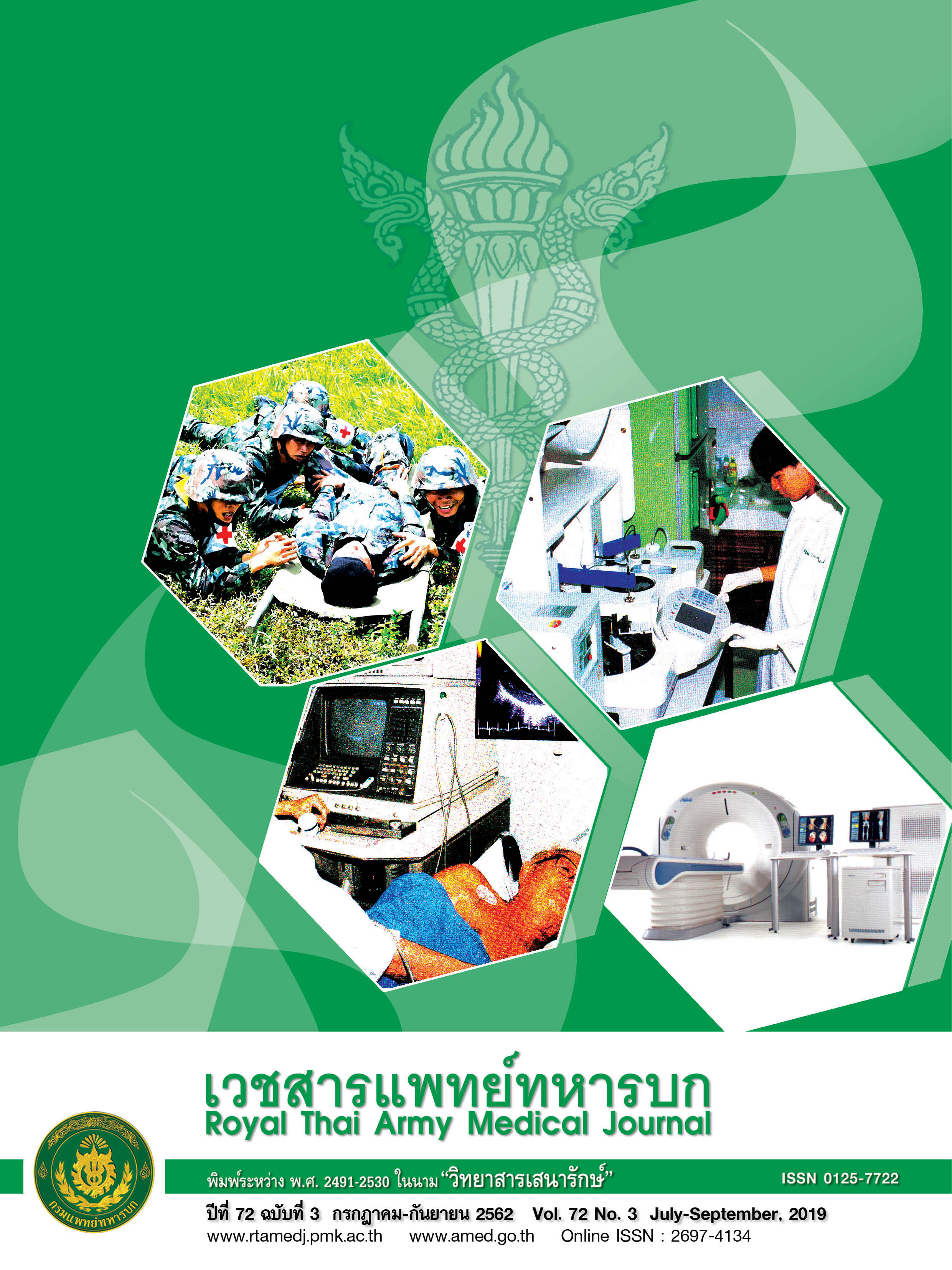การตัดสินความเป็นคู่ขนานของข้อสอบด้านการใช้ยาอย่างสมเหตุผลโดยอาศัยทฤษฎีฉันทามติทางวัฒนธรรมแบบมีรูปแบบ
Main Article Content
บทคัดย่อ
บทนำ: ข้อสอบคู่ขนานด้านการใช้ยาอย่างสมเหตุผลที่สร้างขึ้นก่อนการสอบเพื่อวัดและประเมินผลการเรียนรู้ขาดหลักฐานเชิงประจักษ์ในการตัดสินความเป็นคู่ขนานของข้อสอบ วัตถุประสงค์: เพื่อเปรียบเทียบความเป็นคู่ขนานของข้อสอบคู่ขนานด้านการใช้ยาอย่างสมเหตุผลที่ได้จากการคัดเลือกโดยกลุ่มผู้เชี่ยวชาญกับการตัดสินความเป็นคู่ขนานของข้อสอบโดยอาศัยฉันทามติทางวัฒนธรรมแบบมีรูปแบบและศึกษาระดับความสามารถในการตัดสินความเป็นคู่ขนานของข้อสอบด้านการใช้ยาอย่างสมเหตุผลของผู้เชี่ยวชาญ วิธีดำเนินการวิจัย: ประชากรที่ใช้ในการวิจัยผู้เชี่ยวชาญในการสอนนักศึกษาแพทย์ สังกัดวิทยาลัยแพทยศาสตร์พระมงกุฎเกล้า จำนวน 225 คน ตัวอย่างที่ใช้จำนวน 63 คน ทำการวัดระดับความสามารถในการตัดสินความเป็นคู่ขนานของข้อสอบจำนวน 20 ข้อ ซึ่งผ่านการตรวจสอบความตรงตามเนื้อหาและกำหนดความเป็นคู่ขนานของข้อสอบโดยอาศัยผู้เชี่ยวชาญทางเภสัชวิทยาจำนวน 3 คน จากนั้นวิเคราะห์ทางสถิติเพื่อหาระดับความสามารถในการตัดสินความเป็นคู่ขนานของข้อสอบของผู้เชี่ยวชาญและตัดสินความเป็นคู่ขนานของข้อสอบโดยอาศัยทฤษฎีฉันทามติทางวัฒนธรรมแบบมีรูปแบบด้วยโปรแกรม UCINET ผลการวิจัย: ผู้เชี่ยวชาญผ่านเกณฑ์ความสามารถในการตัดสินความเป็นคู่ขนานของข้อสอบ จำนวน 43 คน (ร้อยละ 68.25) และแบบวัดมีความเป็นเอกมิติ (สัดส่วนของค่าไอเกนสูงสุดต่อลำดับที่ 2 = 3.11) ผลการตัดสินความเป็นคู่ขนานของข้อสอบโดยผู้เชี่ยวชาญตามการวิเคราะห์ฉันทามติทางวัฒนธรรมแบบมีรูปแบบ สอดคล้องกับการกำหนดข้อสอบคู่ขนานโดยผู้เชี่ยวชาญตามความตรงตามเนื้อหาจำนวน 16 ข้อ (ร้อยละ 80.00) สรุป การตัดสินความเป็นคู่ขนานของข้อสอบโดยผู้เชี่ยวชาญโดยอาศัยทฤษฎีฉันทามติทางวัฒนธรรมแบบมีรูปแบบมีความสอดคล้องกับการกำหนดข้อสอบคู่ขนานโดยผู้เชี่ยวชาญตามความตรงตามเนื้อหาสูง สามารถใช้ในการตัดสินความเป็นคู่ขนานของข้อสอบก่อนการสอบได้อย่างเหมาะสม
Downloads
Article Details
บทความในวารสารนี้อยู่ภายใต้ลิขสิทธิ์ของ กรมแพทย์ทหารบก และเผยแพร่ภายใต้สัญญาอนุญาต Creative Commons Attribution-NonCommercial-NoDerivatives 4.0 International (CC BY-NC-ND 4.0)
ท่านสามารถอ่านและใช้งานเพื่อวัตถุประสงค์ทางการศึกษา และทางวิชาการ เช่น การสอน การวิจัย หรือการอ้างอิง โดยต้องให้เครดิตอย่างเหมาะสมแก่ผู้เขียนและวารสาร
ห้ามใช้หรือแก้ไขบทความโดยไม่ได้รับอนุญาต
ข้อความที่ปรากฏในบทความเป็นความคิดเห็นของผู้เขียนเท่านั้น
ผู้เขียนเป็นผู้รับผิดชอบต่อเนื้อหาและความถูกต้องของบทความของตนอย่างเต็มที่
การนำบทความไปเผยแพร่ซ้ำในรูปแบบสาธารณะอื่นใด ต้องได้รับอนุญาตจากวารสาร


